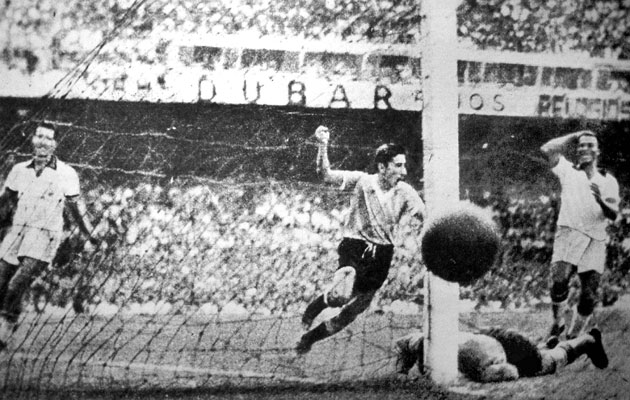Uruguayan football legend Alcides Ghiggia has died on the 65th anniversary of the shock 2-1 World Cup Final victory over Brazil in which he struck the winning goal.
Ghiggia, 88, had been treated in hospital in Montevideo for heart problems after being taken ill on Wednesday.
Until Brazil’s 7-1 humiliation by Germany at last year’s World Cup, the Maracanazao of 1950 had been greatest symbol of shame in their sporting history. Yet, in later years, Alcides Edgardo Ghiggia always received a generous welcome on his visits.
His place in football history was secured on July 16, 1950. The giant new Maracana in Rio de Janeiro had been built with the specific expectation that Brazil would be crowned world champions in front of 200,000 of their own fans.
Brazil needed only a draw because the concluding stage was a mini league; Uruguay had to win.
No-one doubted the outcome. One newspaper printed a poster, three days before the game, with a picture of the Brazilian team proclaimed as ‘Champions of the World.’ Some Uruguayan directors were so convinced of the outcome they left for home the day before the game.
Brazil went close to scoring three times in the first five minutes. At half-time the game was still goalless but two minutes after the restart left-winger Friaca shot them ahead.
Maracana was happily cheering Brazil on to glory when, in the 66th minute, Uruguay equalised through their great inside forward Juan Schiaffino. No worries. A draw was still sufficient.
Then: disaster.
Uruguay broke away. Julio Perez released right winger Ghiggia. He outpaced defender Bigode, cut into the penalty box and shaped to cross. Goalkeeper Moacir Barbosa threw his weight on to his right foot and stepped forward in anticipation . . . so the alert Ghiggia drove the ball between keeper and near post.
https://www.youtube.com/watch?v=M5RtOShUD6Y
Brazil, shattered, could barely pass the ball between each other let alone amount a serious, retaliatory attack.
The final whistle from English referee George Reader signalled victory for Uruguay and a string of reported heart-attack deaths both inside the stadium and across the country.
Ghiggia played on a further three years in Uruguay then spent a decade in Italy with Roma and Milan. In the days of travel travails foreign-based players were largely written off by their own national teams. So he ended his career with a mere four goals in 12 international matches, all scored in that 1950 World Cup.
Back in Brazil to attend the World Cup last year he said: “People here love their football above all else. They don’t hold grudges. I feel very proud of being Uruguayan but I also respect Brazil a great deal. It’s a country full of joy, they welcome you with open arms so for me it’s beautiful to be here.
“After all, this is football – and people win and people lose and that event at Maracana was what it was. The Brazilians were sad at the time but they have won five World Cups since then so I’m happy for them.”
Back in 1950 Uruguay opened their campaign by winning their first game 8-0 against Bolivia. Ghiggia scored the eighth goal, three minutes from the end in the Estadio Independencia in Belo Horizonte (which later proved England’s football graveyard against the United States).
He scored in a 2-2 draw with Spain then again in a 3-2 win over Sweden.
The subsequent winning goal in Maracana thus made him the first man to score in every possible match in finals (20 years before Brazil claimed the honour for Jairzinho in Mexico in 1970).
His admirers always described him as “one of only three men – along with the Pope and Frank Sinatra – to silence Maracana.”






